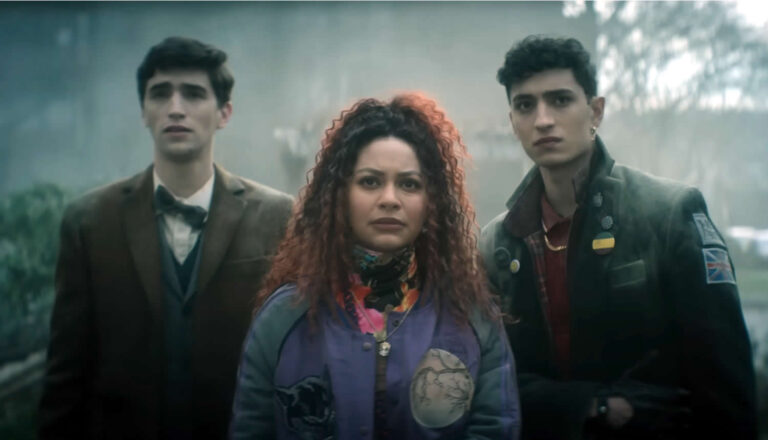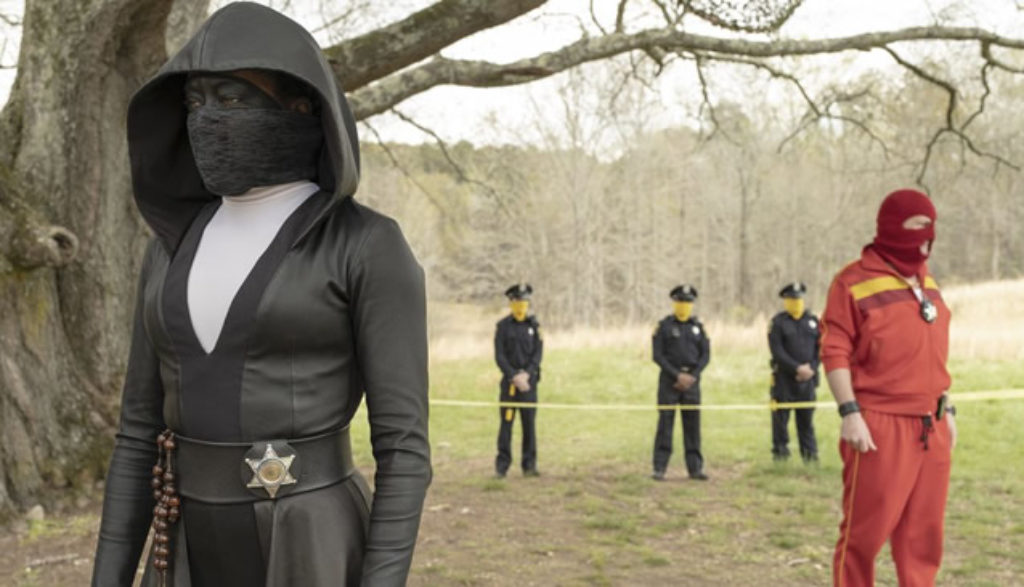
Dead Boy Detectives
Dead Boy Detectives targets teens in style and story. But it comes with very adult, problematic content.

“Nothing ever ends.”
So the godlike Doctor Manhattan tells onetime superhero-turned-businessman Adrian Veidt near the end of DC’s game-changing comic series Watchmen. And it’s best not to argue with Doctor Manhattan.
It’s been more than 30 years since the events chronicled in Watchmen came to a close. The giant squid that apparently killed half of New York City is no more. Neither is the vigilante Rorschach—killed to keep a terrible secret safe.
But both, in their own way, live on.
It’s 2019 now, and tiny squid still fall from the sky sometimes—a messy nuisance more than anything. Clean the little guys off your windshield and you’re good to go.
The country’s racial and societal divides aren’t nearly as easy to wash away.
With President Robert Redford now in the 27th year of his presidency, the United States has become a place ruled by the best of liberal intentions. Redford helped push through a Reparations bill meant to wipe away racial strife, but it might’ve had the opposite effect. Strict gun restrictions have made police-involved shootings much more rare … unless you’re talking about the police getting shot.
Several years ago, disenfranchised white supremacists turned the late vigilante Rorschach into their patron saint: They donned copies of his telltale mask, dubbed themselves the Seventh Kavalry and declared war on Redford’s society, particularly the police. And while they eventually lost that war, it changed law enforcement forever. Now, it’s the police who wear the masks—to protect their identities and their families from those who might mean them harm.
And in Tulsa at least, some have even become dark facsimiles of masked heroes themselves: Looking Glass wears a shiny, blank, full-face mask and questions those who come to him. Sister Night dons garb that looks part ninja, part nun.
But the Kalvary is back, too—announcing its return by gunning down a policeman in a routine traffic stop. In a video, one member says that the group aims to turn Tulsa’s streets into gutters “overflowing with liberal tears.”
And perhaps by the end, the world might long for the days of murderous giant squids.
The BBC’s Nicholas Barber said that when Alan Moore’s and Dave Gibbons’ Watchmen was released in 1986 and ’87, it was “the moment comic books grew up.” It took the previously sainted “superhero,” threw him into a realistic world wracked by political division and Cold War fears and made him painfully, sometimes horrifically, human.
Doctor Manhattan—the only truly superhuman in Watchmen—lost all interest in humanity and exiled himself to Mars. Nite Owl was just a pudgy, middle-age guy with a penchant for gadgets. Rorschach’s heroism went hand in hand with a disturbing cord of bigotry.
The notoriously eccentric Moore once called Watchmen “unfilmable,” an assessment that the 2009 movie based on the comic pretty much supported.
So perhaps wisely, show creator Damon Lindelof (who was also behind ABC’s Lost and HBO’s The Leftovers) didn’t even try. Rather, this is a sequel that spins the narrative forward a few decades, imagining a world spawned by the events of Moore’s work while trying to draw on today’s hot-button concerns.
It’s an interesting, thoughtful effort, one deeply concerned with the impact of racism yet still adept at critiquing progressive overreach. And as it does so, it reminds us of an all-too-frequent truth: The solution to one problem may give rise to another. In this fallen world of ours, nothing ever ends.
But as sharply conceived and written as it might be, this is Watchmen on HBO, with all the problems that that network stereotypically engenders. While nudity doesn’t seem like it’ll be as pervasive as it was in, say, Game of Thrones, Watchmen doesn’t steer away from sex, either. Language can be incredibly harsh and, of course, uncensored.
But it’s the violence that ultimately may shock the most. The world painted in Watchmen is a brutal, often gory one indeed, with neither man nor beast faring particularly well.
In the opening segments of HBO’s Watchmen, a little child escapes a race riot in Tulsa, Okla., with a note tucked in his pocket. “Watch over this boy,” it says. His parents wanted nothing more than to protect their son from the horrific violence that was bound to engulf them all if they weren’t careful.
Perhaps that scene hints at how we should approach HBO’s Watchmen, too. The show itself, after all, is a violent incursion on our peaceful evenings. But since we can easily avoid this encroachment with just the push of a button, we should consider carefully before we watch the Watchmen.
Angela Abar says she’s retired: After she was attacked on what’s known as the White Night, she left the police force and didn’t look back. But secretly, Abar moonlights as Sister Night, a nun-themed, vigilante-like detective—joining several others of her ilk in the tinder-hot confines of Tulsa, Oklahoma. And when a police officer is gunned down by a white supremacist—one with apparent ties to the outlawed Seventh Kavalry—Abar knows her evenings are about to get much more hectic.
After beating a suspect into telling her the location of some Kavalry henchmen, Sister Night and a few other masked police officers invade the farm where they’re holed up. The Kavalry opens fire with a gigantic machine gun, shooting and killing countless cows in the process. (We see the animals both dead and in their painful death throes, and one that Sister Night is hiding behind is shot to hamburger.) Two Kavalry members try to escape in a plane, but they’re torched out of the sky and crash to earth in a fiery ball.
A police officer gets shot several times. (His assailant throws a cabbage head in the car before driving away.) He survives his injuries, but he’s in critical condition as the episode ends. Another man, whom we see hanging by his neck from a tree, isn’t so lucky.
In a flashback to 1921, we see historical footage from the real Tulsa race riots back then: Klansmen shoot and kill men, women and children (one father holds an apparently deaf infant in his arms), and buildings are both torched and blown up. Dead bodies are pulled through the streets via horse-drawn carriage. One boy initially escapes with a man, woman and their baby. But hours later, he comes to in a field: The man and woman are both dead. (We see blood and brain matter on the woman’s head, and the baby squalls in the grass.)
We hear Abar describe her injuries from the White Night attacks. Abar’s daughter attacks a classmate for making a statement that could be construed as racist: We see her later with a bloody nose. Someone dies via a cyanide pill, and foam billows from his mouth.
A man and a woman engage in noisy sex. We hear associated sounds, see movements and glimpse part of the man’s rear. Another man types at an old-fashioned typewriter, apparently completely naked. His maid (sporting a sly smile) rubs his legs (presumably) and comments on the chaffing he’s apparently suffered on them (the result of horseback riding, he says).
Tiny squid fall from the sky and onto streets and cars. (At least some are still alive.) Sister Nun carries a stylized rosary into battle, and her weapons cache includes deadly crucifixes. We see racist imagery and hear racist statements. People drink alcohol, and someone snorts cocaine.
The f-word is used 16 times and the s-word 10 times. We also hear “a–,” “b–ch,” “d–n” and “p-ss.” God’s name is misused four times, thrice with the word “d–n.” Jesus’ name is abused once.


Paul Asay has been part of the Plugged In staff since 2007, watching and reviewing roughly 15 quintillion movies and television shows. He’s written for a number of other publications, too, including Time, The Washington Post and Christianity Today. The author of several books, Paul loves to find spirituality in unexpected places, including popular entertainment, and he loves all things superhero. His vices include James Bond films, Mountain Dew and terrible B-grade movies. He’s married, has two children and a neurotic dog, runs marathons on occasion and hopes to someday own his own tuxedo. Feel free to follow him on Twitter @AsayPaul.

Dead Boy Detectives targets teens in style and story. But it comes with very adult, problematic content.

An elf mage contemplates on connection and regret as she watches her human friends grow old and pass away.